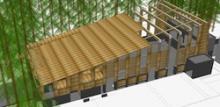Low Carbon Economy
Overview
The Climate Intelligence Program (CIP) provides strategic, evidence- based analysis of climate science, technology, business, and policy. Leveraging a network of academic, private, and public sector partners, the CIP designs practical, cross-cutting solutions for our clients and partners in order to mobilize the innovation and entrepreneurship required to meet the challenges of climate change.
Initiatives
The climate change imperative has created new national and international opportunities for innovation in carbon management. British Columbia is the leading jurisdiction in North America for carbon and climate policy, which creates great opportunities for further innovation in carbon markets and offsetting.
Bioenergy Research and Development Facility
Project Lead: Neil Thomson

UBC in partnership with Nexterra Systems Corp, Jenbacher Ltd. (a subsidiary of GE Energy) and with support from FPInnovations is developing a world-class $36MM, 2MWe (gross) renewable combined heat and power (CHP) demonstration project at UBC’s Point Grey Vancouver campus as part of the Living Lab initiative. The Facility will use biomass gasification to produce a synthesis gas or syngas that will be conditioned and cleaned using Nexterra’s proprietary cleaning/ conditioning system. The clean syngas will then be burned in a high efficiency internal combustion engine to generate combined heat and power. The Facility is expected to offset over 5,500 tonnes of UBC’s GHG emissions annually. Heat and power generated by the BRDF will be distributed via the campus steam and electric power grid and used to heat and power University facilities.
Sauder S3i will be writing a Case Study or narrative report that will succinctly provide an overview of the innovative technology, evaluate how well the Facility is performing in relation to the business case that was developed for it from the outset, identify the key factors that need to be considered if the technology is adopted elsewhere, and make recommendations on how suitable the technology is for further application. While the Case Study will be a stand-alone document, it will also be structured and written so that it can be used to substantially complete reports required by the funding bodies Natural Resource Canada (NRCan), Western Economic Diversification (WED), and the Innovative Clean Energy (ICE) Fund.
![]() Southeast False Creek Neighbourhood Energy Utility Case Study
Southeast False Creek Neighbourhood Energy Utility Case Study
![]() Carbon Governance Project Workshop Series
Carbon Governance Project Workshop Series
![]() Sustainable Commercial Real Estate Sector: Innovation in Assets, Finance, and Policy
Sustainable Commercial Real Estate Sector: Innovation in Assets, Finance, and Policy
![]() Sustainable Sport & Event Planning: Landscape Analysis
Sustainable Sport & Event Planning: Landscape Analysis
![]() Carbon Offsets & Biomass Based Renewable Energy Projects
Carbon Offsets & Biomass Based Renewable Energy Projects
![]() GreenApple SMART Transportation Ranking Report
GreenApple SMART Transportation Ranking Report
PICS Briefing Program
The PICS Briefing Program draws on an emerging network of climate change researchers and practitioners to provide policy relevant climate change briefings to the Province of BC and the general public.

-
Contact the Centre for Social Innovation & Impact Investing